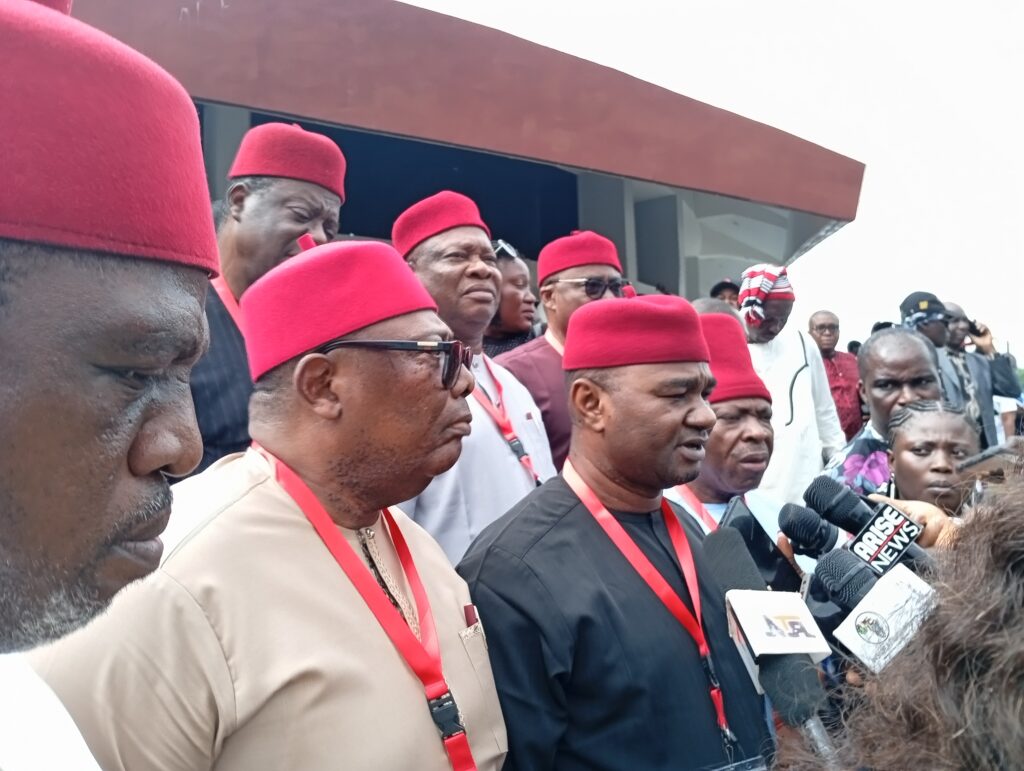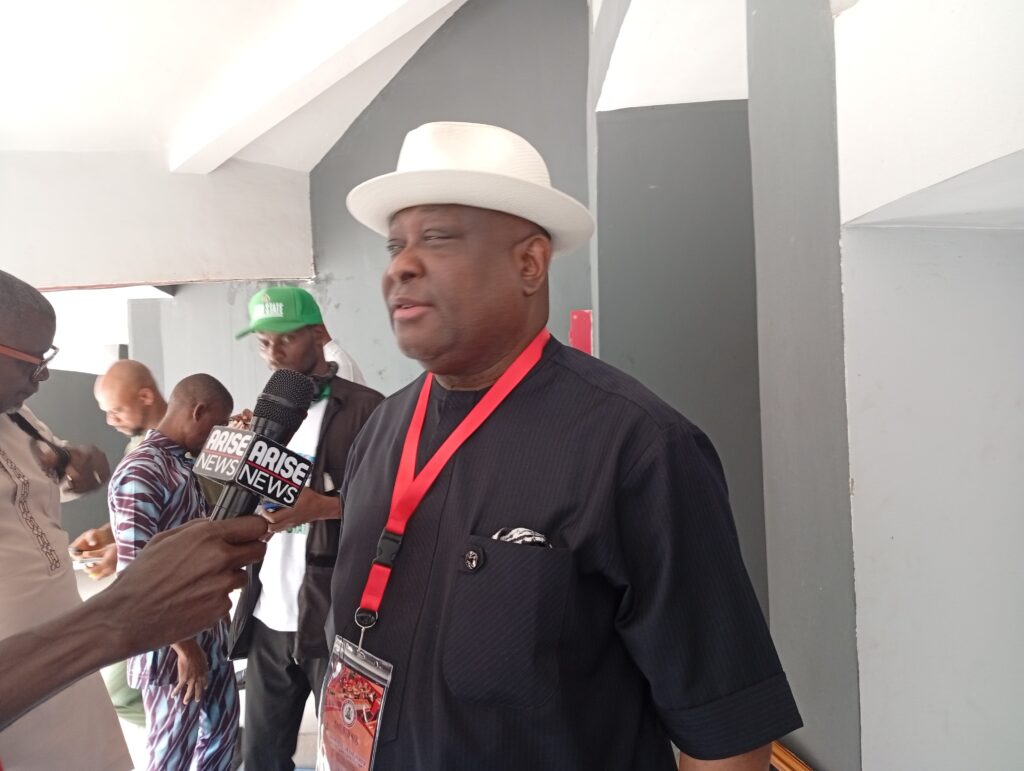Senate Committee on the Review of the 1999 Constitution ‘s public hearing in the South East Nigeria, says it received a total of 59 bills from the government and the people of the South East zone at the just concluded Two-Day public hearing held at the International Conference Centre ( ICC) Enugu.
Chairman of the Committee, and Deputy Whip of the senate, Senator Peter Nwaebonye disclosed that to Newsmen on Saturday, while briefing them at the end of the exercise in ,Enugu.
He said the people of the South East wanted alteration of the 1999 Constitution which was a product of the military regime to address many issues not favourable to many Nigerians.
Among the issues were State Creation; they wanted creation of additional state in the South East; State Police to enhance security, Rotational president to give people sense of belonging, Reserved Seats for Women, Electoral reform, Judicial reform, bill for positions for People living with Disabilities, autonomy of Independent National Electoral Commission,( INEC) among others.

Pix: The senators at the briefing
According to him, the 1999 Constitution will not be dropped, rather , some provisions will be amended. He assured that the senate will look into the demands of the people and come up with acceptable Amended Constitution for equity, Justice and development of the country.
In an interview with Newsmen, Senator Akobundo, from Imo state, said the South East wants additional state and the people of Imo and Anambra wanted Anim state( to be gotten from ihiala, Ihembosi areas of Anambra state as well as Orsu, Orlu areas of Imo state.).He said Ebonyi state was created from Abia and Enugu states, therefore, Anambra and Imo states should give birth to a new state,( the proposed Anim state). ” The South East wants an additional state to bring it to equilibrium”, Senator Akobundo said..
According to him, additional state means getting more development and , additional representations.

Pix: Senator Akobundo(Imo)
He also said participants wanted a Judiciary reform, a Judicial service reform to be able to reduce the volume of cases that go to Supreme court.
In the presentation made by Women”s Rights Advancement and Protection Alternative (WRAPA) delivered by the Monitoring and Evaluation Specialist WRAPA, Enugu State, Faith Joshua-Uba , the group, on behalf of delegates from partner civil society organisations and women’s networks across multiple states appreciated the leadership of the National Assembly and State Governors for prioritizing inclusive governance through the Additional/Reserved Seats Bill, among other critical bills under the review of the 1999 Constitution.
“This Bill is pivotal. If passed, it will position Nigeria for accelerated, inclusive development, aligning us with other progressive nations advancing gender-balanced governance.
” The Bill has received broad endorsement from public consultations, town halls convened across senatorial zones, and thousands of citizens’ signatures nationwide”, she said..
Ubah noted that ,”the passage of the Additional/Reserved Seats for Women proposes:37 additional Senate seats — one per state and FCT74 additional House of Reps seats — two per state108 additional State Assembly seats — three per state
“This affirmative action seeks to correct Nigeria’s alarming underrepresentation of women in governance. We recommend a special constituency arrangement for these seats, with implementation after the current legislative term, lasting for 16 years — across four election cycles — after which a national review will decide its future.Our clear prayer: accelerate passage, state adoption, and presidential assent. This is not a women’s bill — it’s Nigeria’s opportunity for inclusive national development ,Ubah stated..
The group called for reform of NEC leadership appointments, saying the Current provisions under Sections 154(1) and 157 empower the President to appoint, risking political interference and public distrust.
“We propose an independent panel-led, merit-based selection process as recommended by the Justice Uwais Committee and practiced in Kenya, with clear criteria for academic qualifications, governance experience, integrity, and neutrality. Benefits include: safeguarding INEC’s independence, boosting electoral credibility, and restoring public confidence”, she said.
On her part, :a chattered Accountant and Person living with Disability, Chika Agbo called for the alteration of the 1999 constitution to include special quota and seat in governance for people living with Disability.
Agbo advocated favourable environment especially education-wise, noting that some PWD’s need slabs to enable them wheel themselves to classrooms, banks and other places.
She said PWDs suffer discrimination, were under-represented in political and social spaces, stressing that they want true transformation and political will to be part of policy making.
According to Mrs Agbo the women with Disability especially those with hearing impediment need sign language interpreter during antenatal.
Responding to the presentation, Senator Onyekachi Nwaebonyi noted that their proposal merits consideration and approval by the Senate .
In her presentation, the Attorney General and Commissioner for Justice, Anambra State, Sylvia Ifebueme called for alteration of the 1999 constitution to give for a robust consideration of all Nigerians especially those in the south East. Under Judicial Reform.
She proposed that the office of the
Chief Justice of Nigeria should be tenured to 5years. Under Electoral Reform,Another contributor, Kosarachi Onwa called for Independence of INEC, stressing that Nigerians should participate in the process of choosing the Chairman of INEC.
He urged that the constitution be altered to grant financial authority to INEC to include direct approval of INEC budget by the National Assembly instead of the Presidency for independence of the Commission.
Also,a CSO member,Obinna Gabriel posited enfranchisement of people living overseas to enable them participate and cast their votes electronically during elections.
There were other presentations from the President of of Customary Court,Hon. Justice Augustine Nnamani, the Labour force, Women in Mining among others.
participants expressed the hope that their requests will be granted favourable considerations.
Author: Maureen Ikpeama